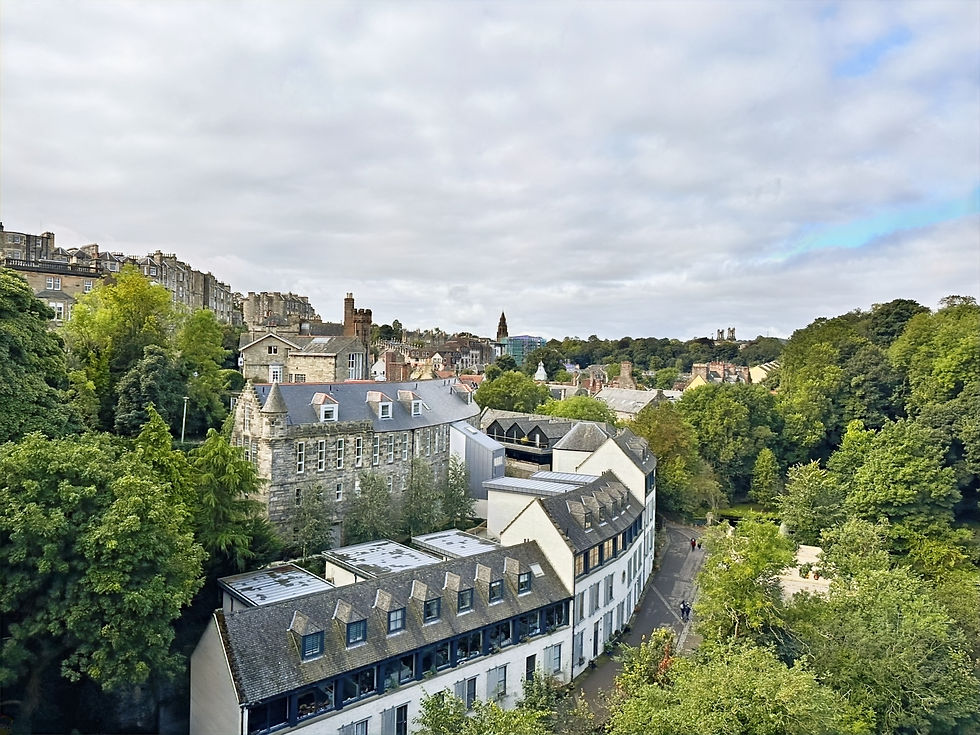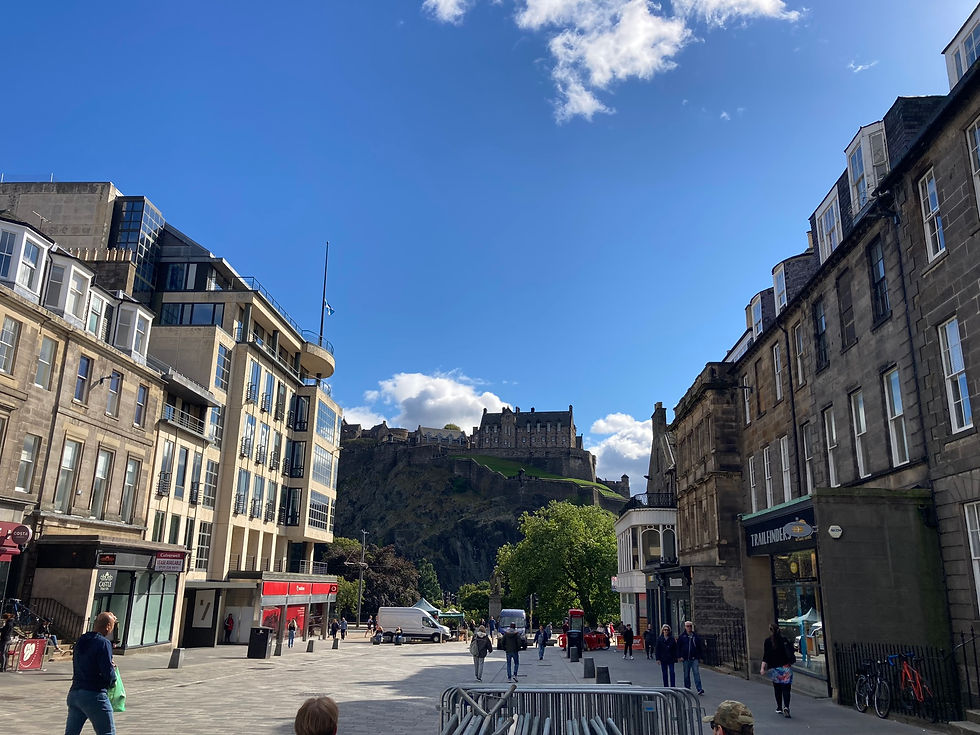How Do I: A Guide to Setting Up Essential Services After Moving Into Your EDI Flat
- Cait Denney
- Sep 16, 2024
- 7 min read

Welcome to Edinburgh! Here’s How to Get Started with Essential Services
Moving to a new city like Edinburgh can be exciting, but it also comes with a lot of logistics. If you're feeling overwhelmed with all the things you need to set up, don’t worry—you’re not alone! I’ve put together this guide to walk you through the basics, from setting up utilities to finding a doctor, so you can settle in more comfortably.
1. Setting Up Gas and Electricity
One of the first things you’ll need to do after moving into your new home is to set up utilities like gas and electricity. Your property manager is usually the best person to guide you on which providers serve your area, and they should help you set up an account or point you in the right direction.
Personal Note: As someone who has lived in Edinburgh for a while, I can tell you that heating costs, especially in the winter, can quickly add up. Many homes, including mine, can only afford to heat for a few hours each day during the colder months. I recommend investing in electric blankets, under-bed warmers, and hot water bottles as budget-friendly ways to keep warm.
2. Signing Up for Council Tax
Council Tax is a local tax that goes toward funding public services in your area, such as waste collection, water, and emergency services. Every household must pay it, but the amount depends on your property's value (also known as your council tax band). Most people in Edinburgh fall into Bands D or E. Below are the council tax charges for Edinburgh for 2024/2025 for budgeting purposes. The full breakdown can be found here.
Band A: £1,329.39
Band B: £1,550.95
Band C: £1,772.52
Band D: £1,994.08
Band E: £2,569.91
Band F: £3,141.73
Band G: £3,745.71
Band H: £4,639.62
Sometimes your property manager will register you for council tax, but if you’re not sure, don’t hesitate to ask them! If you do have to register yourself, you can do so here. If you’re a full-time student, you can apply for an exemption, but if you live with someone who isn’t a student, you’ll only receive a 25% discount. Apply for exemptions or discounts here.
3. Waste and Recycling Collection
You don’t need to register for waste and recycling as it is part of your council tax, but you will need to familiarize yourself with pickup days and how Edinburgh recycles. You can find your collection dates here. Don’t forget to register for garden waste collection if you need it—this service is often charged annually. Be mindful of sorting your waste properly, as recycling guidelines in the UK can differ from those in other countries.
4. Setting Up Internet
Getting reliable internet set up is another essential task. The easiest way to find the right provider is by using a broadband comparison tool such as FibreCompare.com. This will help you find the best deals for your specific address.
5. TV License
In the UK, you need a TV license to watch or record live TV on any channel or to stream shows on platforms like BBC iPlayer. The license costs around £160 per year. Not everyone needs one, so if you only use subscription services like Netflix or Amazon Prime, you might be able to skip it. You can find more information or sign up for a license here.
6. Registering with a Doctor (GP)
Healthcare is an important part of settling in. To register with a General Practitioner (GP), you need to find one that serves your local area. Your flat will place you within the catchment area of several GP practices. Each practice has its own intake procedures, and these can vary significantly. For example, some practices may require you to physically show up early in the morning with a completed form and register in person. Other practices may ask you to leave a voicemail and wait a few weeks for a callback to complete your registration.
If you have a medical emergency before registering with a GP, you should go to A&E (Accident & Emergency) or call 999 for urgent care.
To find out which GP practices cover your area, you can use the NHS website to enter your address, which will provide a list of nearby practices and their registration process: NHS GP Finder.
If you prefer to avoid NHS wait times, you can also explore private healthcare insurance, which can help you bypass long waitlists for specialists. A good resource for comparing private health insurance options is Confused.com. This site allows you to compare different policies and choose one that suits your needs and budget.
Personal Note: If you have any chronic conditions, to reduce the pressure on getting into a GP practice try and bring a long term supply of medication/hard to get supplies with you where possible and start the process as soon as you have signed the lease.
7. Finding a Dentist
Not all dentists in the UK offer NHS services, and many who do may not have space for new patients. Private dentistry is often the only option for expats or remote workers. I recommend searching for local private practices or asking neighbors for recommendations.
8. Optometrist Services
Vision care is another essential to sort out. Many optometrists offer both private and NHS services. Even if you don’t have any immediate eye care needs, it’s good to know who to contact in case you need an eye exam or new glasses. You can use the NHS website to find a local practice or use Google Maps to search nearby options.
9. Turning Over Your Driver’s License to a UK License
If you’ve moved from a country outside the UK, you may need to transfer your driver’s license to a UK one after living here for a certain period. For most non-EU licenses, you can use your original license for up to 12 months, but after that, you’ll need to apply for a UK license. You can find more information here.
Personal Note: Most cars in the UK are manual. If you take your driving test in an automatic car, your license will be restricted to automatic vehicles. Automatic cars are more expensive to rent and buy, but driving schools are available if you want to learn to drive manual. That said, many residents, including myself, have found that living car-free is easier and often faster for getting around Edinburgh (especially by cycle!).
10. Setting Up a Bank Account
Setting up a UK bank account is essential for managing your finances. For any of the banks, you’ll need:
Proof of Identity (e.g., passport or national ID).
Proof of Address (e.g., utility bill or tenancy agreement).
Proof of Income or Employment or Student status (some banks may require this for certain accounts).
Here are some banks with branches in Edinburgh (this is not an exhaustive list):
HSBC: HSBC offers specific accounts for non-UK residents and has several branches in Edinburgh. Their international banking services make it easier for expats and foreign nationals to manage their money while living abroad. You’ll need proof of identity, address, and possibly proof of income. They do not accept a rental agreement as proof of address.
Barclays: Barclays is another major bank in Edinburgh. They have a comprehensive online application process but also provide in-person services at their branches for expats who prefer assistance with the paperwork.
Royal Bank of Scotland (RBS): As a bank headquartered in Edinburgh, RBS is well-known for providing accessible services. Their international account services may also be useful if you are transferring funds from abroad.
In addition to these, you can also explore digital banks like Monzo and Revolut, which have fewer documentation requirements and offer flexible mobile banking, although they may not have physical offices in Edinburgh. These can be particularly good for students.
A Note on International Money Transfers:
If you're looking for an easy and cost-effective way to transfer money internationally, Wise is an excellent option. Wise offers low fees and some of the most competitive digital exchange rates for international transfers, making it popular for those who need to send money across borders. You can set up a Wise account online and transfer money directly from your home bank to a UK account or vice versa.
It’s a good idea to compare each bank’s services, such as international transfer fees and account management options, before making your choice.
Personal Note: I recommend making an appointment with the bank to ensure you meet with the right teller on time or you might wait alittle while until someone is free. The beginning of the school year is a particularly busy time for the banks.
11. Getting a Local UK Phone Number
Once you've moved, it’s a good idea to set up a local UK phone number for ease of communication. This is especially helpful for setting up services like banking, utilities, or even getting in touch with your property manager. To get a UK number, you can either sign up for a SIM-only plan or opt for a phone contract.
To set up a mobile phone contract, you’ll need:
Proof of Identity (e.g., passport or driving license).
Proof of Address (e.g., a utility bill or rental agreement).
Bank Details (to set up direct debit payments for monthly charges).
Popular mobile providers in the UK include EE, O2, Vodafone, and Three. You can visit their stores or apply online for a SIM card or contract, depending on your preferences. Many companies also offer pay-as-you-go plans if you don’t want to commit to a contract right away.
Conclusion
Don’t hesitate to reach out to your property manager or local council if you need more assistance. If you would feel more comfortable sitting down for a few hours and just having an open Q&A conversation feel free to reach out to me and let's see if we can add it to your services. Welcome to Edinburgh!

Incase any of the links did not work please find them exposed here:



Comments